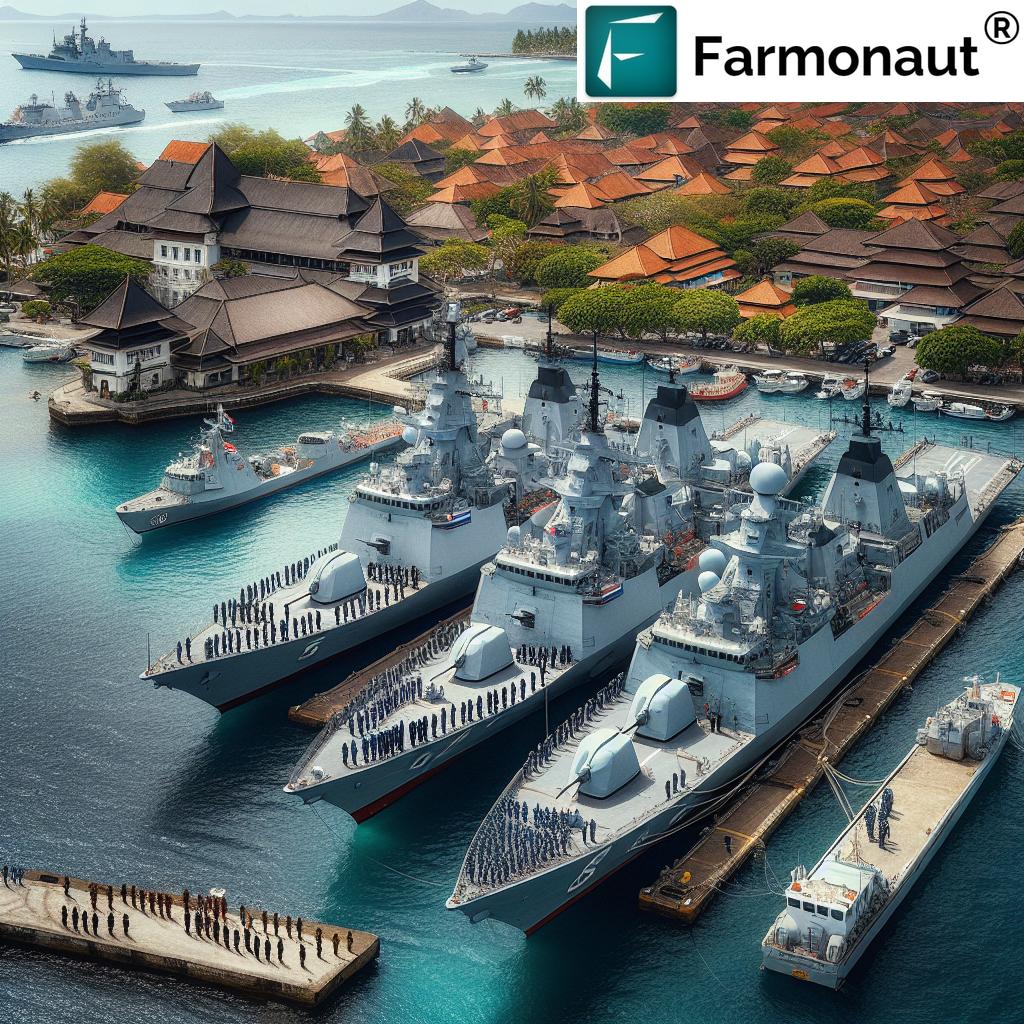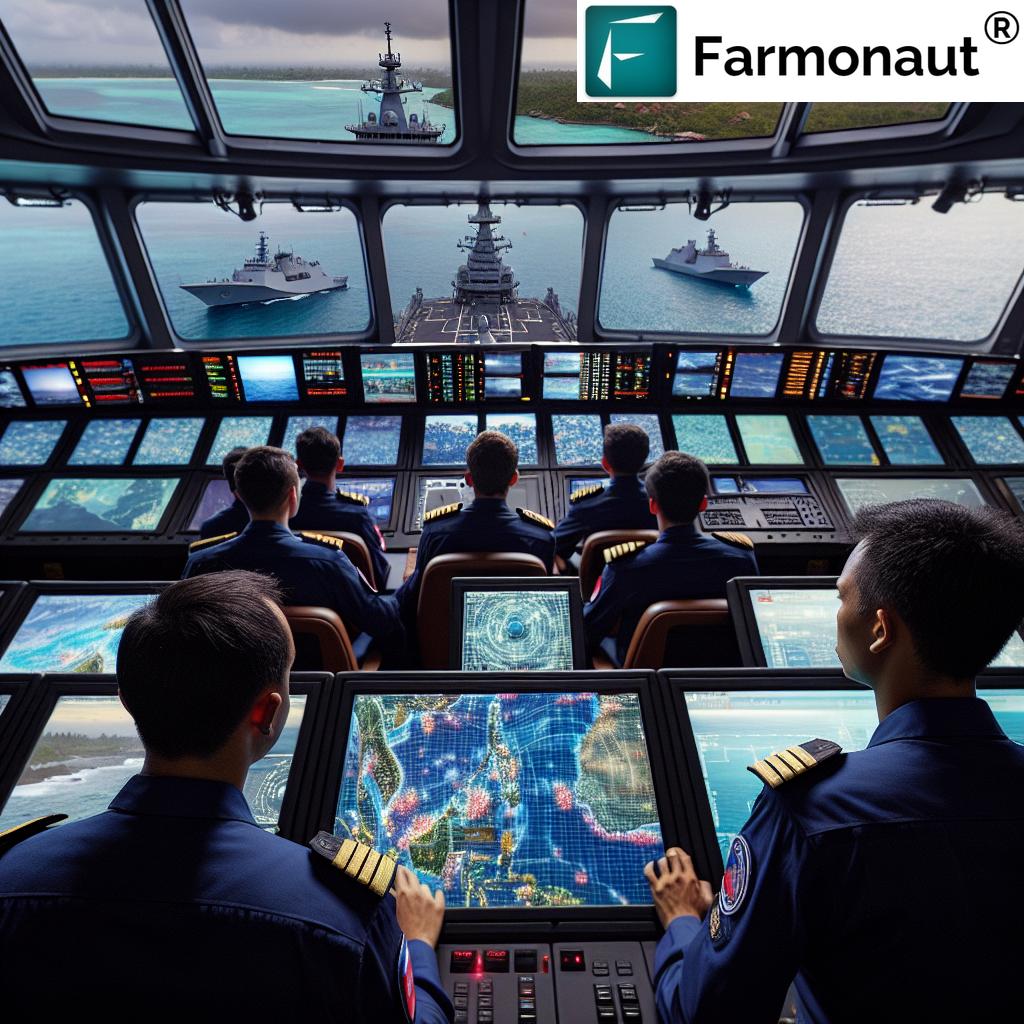French-Australian Naval Collaboration Strengthens Indo-Pacific Defense: Key Insights from Bali’s International Fleet Visit
“Three French frigates and one Australian destroyer docked at Benoa Port, showcasing Indo-Pacific naval collaboration.”
In the ever-evolving landscape of international defense and maritime security, we’ve witnessed a significant development that underscores the growing importance of naval diplomacy in Southeast Asia. The recent French naval visit to Bali, coupled with Australia’s participation, marks a pivotal moment in Indo-Pacific defense collaboration. This event not only symbolizes the strengthening of international naval exercises but also highlights the critical role of maritime security partnerships in maintaining regional stability.

The Arrival of International Naval Forces
On January 28, 2025, the picturesque island of Bali welcomed an impressive fleet of international naval vessels. Three French frigates – FNS Forbin (D620), FNS Provence (D652), and FNS Alsace (D656) – graced the waters of Benoa Port, Denpasar. This French naval visit to Bali was further complemented by the presence of the Australian destroyer HMAS Hobart (DDG 39), which had arrived two days earlier on January 26.
The arrival of these ships is not just a routine port call; it represents a significant step towards strengthening military relations between Indonesia, France, and Australia. This collaborative effort is a testament to the growing focus on Indo-Pacific defense collaboration and the importance of international naval exercises in fostering regional security.
Mission Objectives and Significance
- Crew Rotations: Allowing for the exchange of personnel and expertise
- Ship Maintenance: Ensuring the vessels are in top condition for their ongoing missions
- Cultural Exchange: Providing an opportunity for sailors to experience Bali’s rich culture
- Strategic Positioning: Demonstrating a united front in the Indo-Pacific region
Indonesian Navy Commodore I Made Wira Hady Arsanta Wardhana emphasized the importance of this visit, stating that such international cooperation is vital for enhancing military partnerships in the region. The presence of these naval forces in Bali serves as a clear indicator of the shared commitment to maritime security and regional stability.
Future Movements and Strategic Implications
Following their stay in Indonesia, the French frigates FNS Forbin and FNS Provence are scheduled to proceed to Manila, Philippines, while FNS Alsace will set sail towards Okinawa, Japan. These movements underscore the extensive reach and strategic importance of this naval mission across the Indo-Pacific region.
The presence of the Australian destroyer HMAS Hobart, under the command of Captain Alisha Withers, further amplifies the collaborative nature of this naval diplomacy. It showcases the strong alliance between France and Australia in their commitment to regional security and stability.
Enhancing Military Partnerships
Commodore Wardhana highlighted the far-reaching implications of these naval visits. They pave the way for:
- Potential future joint military exercises
- Soldier exchanges for enhanced training and cooperation
- Collaborative defense technologies sharing
These initiatives are crucial in building a robust network of defense capabilities across the Indo-Pacific region. By fostering closer ties between Indonesia, France, and Australia, this naval collaboration sets the stage for more comprehensive and effective regional security strategies.
“The French aircraft carrier Charles de Gaulle’s positioning in West Lombok demonstrates France’s military presence in the region.”
French Aircraft Carrier’s Strategic Positioning
Adding to the significance of this naval collaboration is the presence of the French aircraft carrier Charles de Gaulle, currently positioned at Gili Mas Port in West Lombok. This deployment is a clear demonstration of France’s commitment to maintaining a strong military presence in the Indo-Pacific region, working alongside its allies to ensure peace and stability.

Indonesia’s Evolving Role in Regional Defense
The docking of these international naval vessels in Bali and the broader deployment of French forces highlight Indonesia’s growing importance within the regional defense landscape. As a key player in Southeast Asia, Indonesia’s role in facilitating and participating in such international naval exercises is crucial for maintaining peace and security in the Indo-Pacific.
This collaborative engagement is expected to:
- Facilitate deeper military exchanges
- Promote regional stability
- Enhance response strategies among participating nations
By hosting these naval forces, Indonesia demonstrates its commitment to being an active participant in shaping the security architecture of the region.
Technological Exchange and Maritime Security
One of the key aspects of this naval collaboration is the potential for technological exchange and advancements in maritime security. The presence of modern naval vessels from France and Australia provides an excellent opportunity for Indonesia to gain insights into cutting-edge naval technologies and strategies.
Areas of potential technological collaboration include:
- Advanced radar and surveillance systems
- Maritime communication technologies
- Anti-submarine warfare capabilities
- Cybersecurity in naval operations
This exchange of knowledge and technology is crucial for enhancing the overall maritime security capabilities of all nations involved, contributing to a more secure and stable Indo-Pacific region.
Naval Collaboration Comparison
| Collaboration Aspect | France | Australia | Impact on Indo-Pacific Defense |
|---|---|---|---|
| Naval Assets Deployed | 3 Frigates, 1 Aircraft Carrier | 1 Destroyer | Enhanced maritime presence and capability demonstration |
| Port Visits | Bali, West Lombok | Bali | Strengthened diplomatic ties and regional engagement |
| Joint Exercises Conducted | Planned future exercises | Planned future exercises | Improved interoperability and shared tactical knowledge |
| Technology Sharing Initiatives | Advanced naval systems | Maritime surveillance tech | Modernization of regional naval capabilities |
| Cultural Exchange Programs | Crew interactions in Bali | Crew interactions in Bali | Enhanced mutual understanding and cooperation |
| Maritime Security Contributions | Regional patrols, anti-piracy efforts | Intelligence sharing, joint patrols | Increased security and stability in vital sea lanes |
| Regional Diplomatic Influence | Strengthened presence in Southeast Asia | Reinforced ties with regional partners | Balanced power dynamics and multilateral cooperation |
Implications for Regional Stability
The naval collaboration between France, Australia, and Indonesia has far-reaching implications for regional stability in the Indo-Pacific. By working together, these nations are creating a powerful deterrent against potential threats to maritime security and reinforcing the importance of international law in resolving conflicts.
Key benefits of this collaboration include:
- Enhanced response capabilities to natural disasters and humanitarian crises
- Improved coordination in combating transnational crimes like piracy and illegal fishing
- A unified approach to addressing regional security challenges
- Promotion of freedom of navigation and overflight in the Indo-Pacific
These collaborative efforts contribute significantly to maintaining peace and stability in one of the world’s most strategically important regions.
Future Prospects of Indo-Pacific Defense Collaboration
As we look to the future, the French-Australian naval collaboration in Indonesia sets a precedent for further defense cooperation in the Indo-Pacific region. This event is likely to catalyze more frequent and comprehensive joint military exercises, technology sharing initiatives, and strategic dialogues among participating nations.
Potential areas for future collaboration include:
- Joint maritime domain awareness programs
- Collaborative research and development in naval technologies
- Shared training programs for naval personnel
- Coordinated efforts in maritime law enforcement
These initiatives will not only strengthen the military capabilities of the nations involved but also contribute to a more stable and secure Indo-Pacific region.
Economic Implications of Naval Cooperation
While the primary focus of this naval collaboration is on defense and security, it’s important to recognize the potential economic benefits that can arise from such partnerships. Increased naval cooperation often leads to:
- Enhanced trade relations between participating countries
- Opportunities for defense industry collaboration and technology transfer
- Improved security for vital sea lanes, benefiting international commerce
- Potential for joint maritime resource management initiatives
These economic aspects underscore the multifaceted nature of international naval cooperation and its far-reaching impacts beyond just military considerations.
Challenges and Considerations
While the French-Australian naval collaboration in Indonesia presents numerous opportunities, it’s also important to address potential challenges and considerations:
- Balancing regional power dynamics and perceptions
- Ensuring clear communication and coordination among diverse naval forces
- Addressing potential environmental concerns related to increased naval activity
- Maintaining transparency to avoid misunderstandings with other regional powers
Addressing these challenges proactively will be crucial for the long-term success and sustainability of such international naval collaborations.
Conclusion: A New Era of Naval Diplomacy
The French-Australian naval collaboration in Indonesia, marked by the visit of three French frigates and an Australian destroyer to Bali’s Benoa Port, heralds a new era of naval diplomacy in the Indo-Pacific region. This event symbolizes the growing importance of international cooperation in maintaining regional security and stability.
Key takeaways from this collaboration include:
- Strengthened military ties between Indonesia, France, and Australia
- Enhanced maritime security capabilities through technology sharing and joint exercises
- Increased regional stability through coordinated naval presence
- Potential for future economic and diplomatic benefits
As we move forward, the success of this naval collaboration sets a positive precedent for future international military relations and cooperative efforts aimed at maintaining peace and stability in the Indo-Pacific region. It underscores the importance of strategic partnerships in navigating complex geopolitical challenges and ensures that nations can work together effectively in both crises and routine naval operations.
The naval diplomacy demonstrated in Bali is more than just a display of military might; it’s a testament to the power of international cooperation in creating a safer, more secure world for all.
FAQ Section
Q1: What is the significance of the French-Australian naval visit to Bali?
A1: The visit symbolizes strengthened Indo-Pacific defense collaboration, enhances international naval exercises, and showcases maritime security partnerships in Southeast Asia.
Q2: How many ships were involved in this naval collaboration?
A2: Three French frigates (FNS Forbin, FNS Provence, FNS Alsace) and one Australian destroyer (HMAS Hobart) were involved in the visit to Benoa Port, Bali.
Q3: What are the main objectives of this naval mission?
A3: The objectives include crew rotations, ship maintenance, cultural exchange, and paving the way for future joint military exercises and technology sharing.
Q4: How does this collaboration impact regional stability?
A4: It enhances response capabilities to regional challenges, improves coordination in combating transnational crimes, and promotes freedom of navigation in the Indo-Pacific.
Q5: What future prospects does this naval collaboration hold?
A5: It sets a precedent for more frequent joint military exercises, technology sharing initiatives, and strategic dialogues among participating nations in the Indo-Pacific region.
Earn With Farmonaut: Affiliate Program
Earn 20% recurring commission with Farmonaut’s affiliate program by sharing your promo code and helping farmers save 10%. Onboard 10 Elite farmers monthly to earn a minimum of $148,000 annually—start now and grow your income!
For more information on Farmonaut’s innovative agricultural solutions, visit our 
Explore our API capabilities: Farmonaut API
For detailed API documentation, visit: API Developer Docs
Download our mobile apps:






